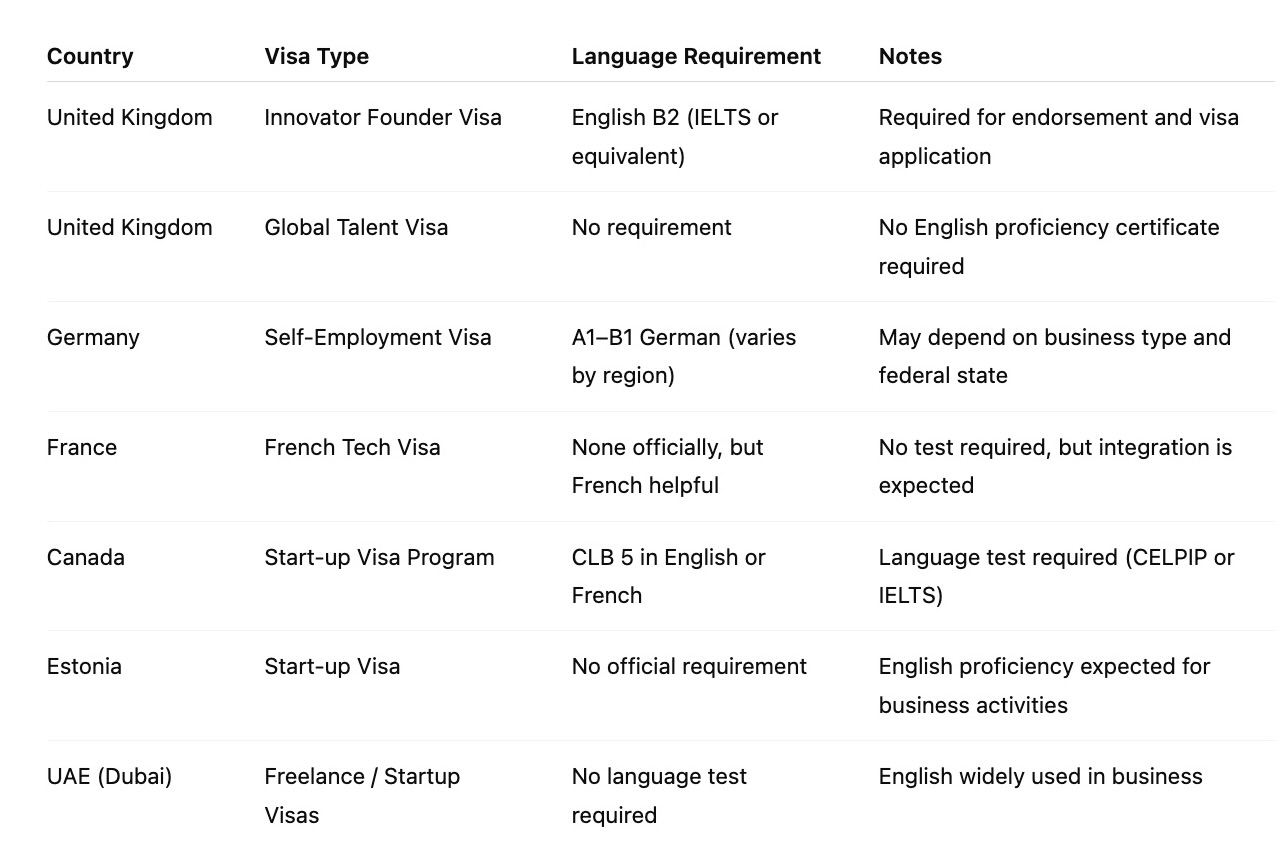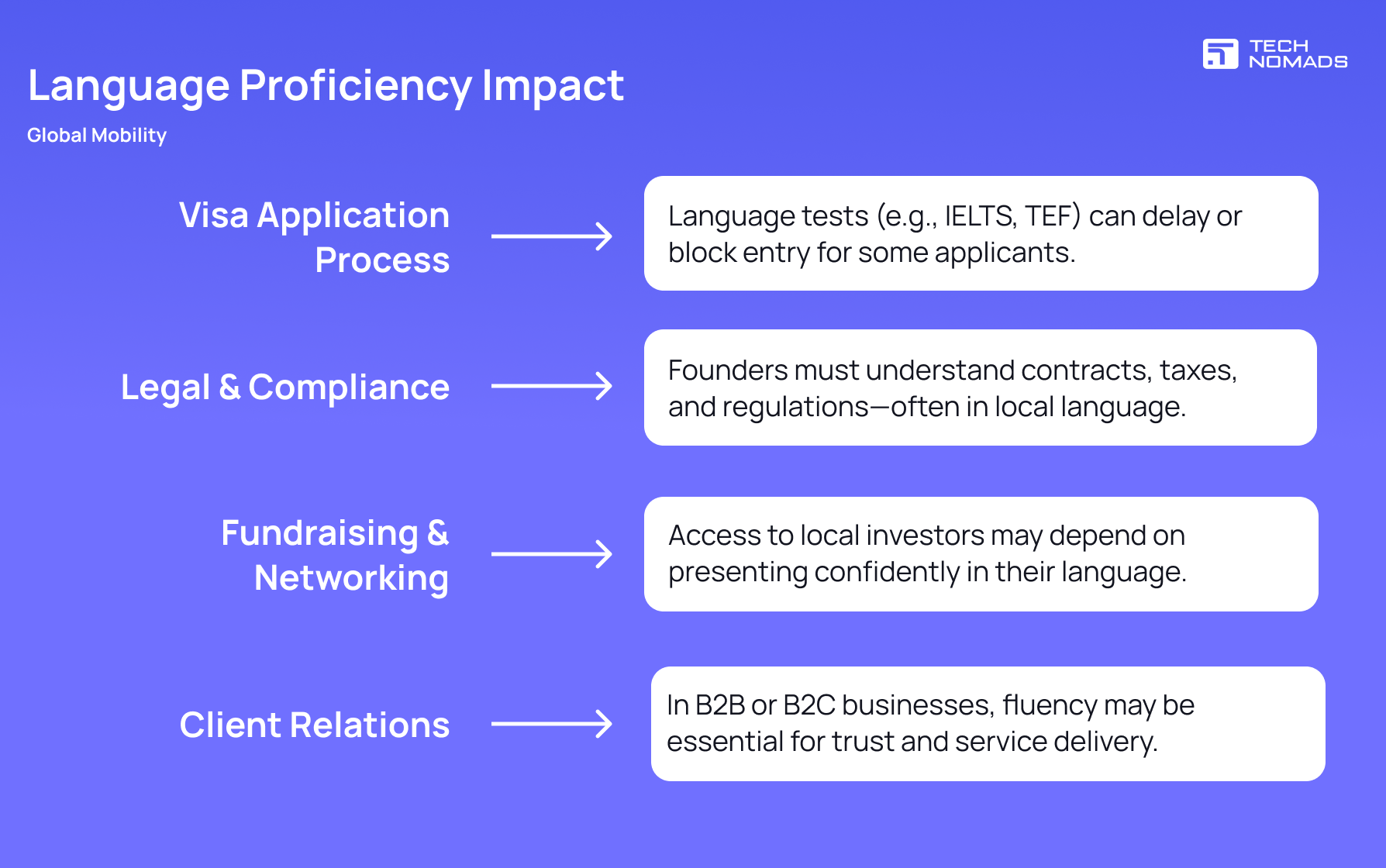
Seek more insights? Subscribe to our Monthly Newsletter
For globally minded founders, choosing where to launch or grow a startup isn’t just about taxes or access to funding anymore. More and more, it comes down to language—specifically, the language requirements tied to immigration routes.
This isn’t just a technical hurdle. It’s a real fear for many. What if I can’t lead a team because I don’t speak the language well enough? What if I misunderstand a legal document or miss out on a funding round because I couldn’t follow the conversation fast enough? These are the kinds of doubts that quietly shape big decisions—like where to incorporate or whether to go global at all.
Yes, English still dominates the world of international business. But plenty of startup visa programmes come with minimum language requirements. And for founders who aren’t fluent—or who want to build in countries where English isn’t enough—that can close doors before they’ve even had the chance to knock.
Language shows up again and again—far beyond the visa stage. From understanding legal contracts to hiring your first employee, building a local network, or pitching to investors, language touches every part of running a company.
As more countries compete to attract startup founders, they’re not just setting financial thresholds—they’re setting linguistic ones too. In many cases, it’s not your business idea that gets tested first, but your ability to communicate it in the right language.
So how do top visa routes compare when it comes to language? Let’s take a look:

At Tech Nomads, we support founders through every step of their relocation journey—and we’ve seen how language, often overlooked, can quietly shape everything from where you incorporate to how fast you scale.
In this article, we’ll explore how language impacts founder decisions, highlight visa routes more accessible to non-native English speakers, and share practical tips for overcoming linguistic hurdles when relocating.
Top Mistakes Tech Founders Make When Applying for the UK Innovator Founder Visa
Innovator Founder Visa Myths: What Immigration Lawyers Wish You Knew
Top 5 Types of Tech Founders Who Should Consider the UK Innovator Founder Visa
Founders often weigh many factors when deciding where to build a company—investment climate, access to talent, infrastructure. But language? It’s often the silent dealbreaker.
What matters isn’t just whether you can order a coffee or get through passport control—it’s whether you can build. Hire. Pitch. Navigate bureaucracy. Lead. And all of that depends on how language shows up in your visa process, your day-to-day life, and your ability to build meaningful relationships in a new place.
In some countries, language requirements are formal and test-based. In others, they’re informal but powerful. A country may not require a language exam—but if government websites, incubators, or grant applications are all in the local language, the message is clear.
Imagine a founder from Brazil choosing between Canada and Germany. Both offer strong ecosystems. But in Canada, English is widely spoken, and immigration processes reflect that. In Germany, while English may be used in tech circles, much of the public-sector infrastructure still operates in German—which can be intimidating and isolating without support.
That’s why, for many, language proficiency becomes a strategic factor. Multilingual founders gain agility. Those who aren’t fluent yet must decide: should I choose an English-friendly destination, or invest early in learning the local language?
Either way, it’s a decision that affects everything from speed of execution to personal wellbeing.
Key Areas Where Language Proficiency Affects Founders:

Overcoming the Language Barrier: Strategies for Non-English-Speaking Entrepreneurs
Starting a business in a new country is always a challenge. Doing it in a language you don’t feel confident in? That’s a whole different story. For many founders, the language barrier isn’t just about grammar—it’s about feeling like you’ve lost control of your own voice.
But here’s the good news: with the right strategies, you can build and grow your company abroad—even if you're not fluent. At Tech Nomads, we guide entrepreneurs through this every day. Here’s what works:
Some countries make it easier for non-native English speakers to thrive. For example:
But don’t just check the visa page. Look deeper:
Choose a place where you won’t just survive—you’ll connect.
You don’t need to speak perfect English to impress investors. But you do need to speak clearly about your business.
Business English is its own skill set. Focus on:
Apps like DeepL and Google Translate are useful—but they aren’t perfect. A mistranslated contract clause or visa form could cost you time and money.
Smart use:
Hiring someone who speaks both your language and the local one can change everything. Whether it’s a co-founder, assistant, or part-time freelancer, this person can help:
If you’re a solo founder, this kind of support can be your bridge to the ecosystem.
Not every country offers formal support for non-native speakers—but many have grassroots networks that can help.
Look for:
These networks often give you access to resources and opportunities that never show up on official sites.
And if you're looking for a global, supportive space designed specifically for mobile founders, join the Tech Nomads Club—a private community where you can connect, ask questions, and learn from others building startups around the world.
You don’t need perfect English—or perfect German, French, or Estonian—to build a successful company abroad. What you do need is a plan, the right support, and the confidence to keep going, even when things get lost in translation.
At Tech Nomads, we’re here to help you make that plan. From choosing the right visa route to preparing for real-world challenges like language, we guide founders through global mobility with clarity and care.
The language barrier—like any challenge founders face—is tough, but it’s solvable. Especially when you don’t face it alone.
Tech Nomads Club is a curated global community for highly skilled professionals.
We host free, application-based events including expert panel talks, start-up pitch days, members-only networking, informal meetups, and fireside conversations with industry leaders.
Membership is free but selective — open to those building across borders and seeking meaningful growth through connection, knowledge, and community.
We also produce a regular podcast, sharing real stories, insights, and voices from inside the Club.
To explore your relocation options, you may:
Subscribe to our social media platforms to stay up-to-date on global mobility news and opportunities: